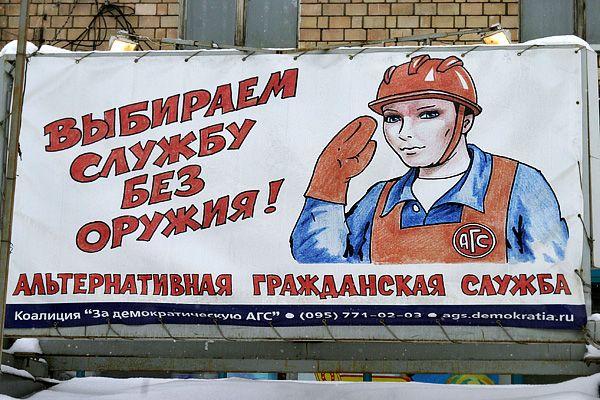Law on Alternative Military Service can be made unreasonably severe and formal
Aliaksandr Lukashenka
has approved the plan for preparing bills for 2013. One of them can
be called sensational for the Belarusian reality – "On
Alternative Service". However, there is a risk that this reform
will take place without the participation of civil society.
The
essence of the alternative civilian service (ACS) is that in
countries with universal military duty the people who refuse to take
up arms because of their deep convictions, often religious or
pacifist character, are allowed to perform the duty in a different
form. Most often, it is work in hospitals, hospices, nursing homes
and other institutions that are suffering from staff shortages.
The
right to alternative service is enshrined in Article 57 of the
Belarusian Constitution. However, there is still no appropriate law
for it. It turns out that the recruits who want to exercise their
constitutional right, are considered as "evaders" in terms
of military offices and courts.
Long protraction
because of the lobby of security forces
The
adoption of such evidently necessary law has been delayed for a long
time. The head of the Center for Legal Transformation "Lawtrend",
lawyer Alena Tankachova, says: "If this gap has not been
eliminated for 18 years, there arises question whether the
legislative organs have a sufficiently responsible attitude to the
constitutional norms and realization of the constitutional rights of
citizens."
Moreover, back in 2000 the Constitutional
Court urged to adopt such a law. In February 2010, such errand was
given to the state secretary of the Security Council Leanid Maltsau
by Lukashenka himself. Observers attribute this to the celebrated
cases of the conscientious objectors Dzmitry Smyk and Ivan
Mikhaylau.
However, the working group formed for drafting the
law, hasn't presented it to the Parliament for a long time.
The
coordinator of the campaign "For Alternative Civilian Service"
Mikhail Pashkevich
says that the main opponent of the law on
alternative civilian service was the Ministry of Defense. The matter
is that the alternative service allows one to choose which means that
the military will have to take efforts to make draftees choose the
military service. "As long as there appears a competitor, it
becomes difficult to maintain the status quo and receive the same
means from the budget without changing anything," sums up the
activist.
Authorities refuse from services of civil
society
The Center for Legal Transformation "Lawtrend",
headed by Alena Talkachova, has been developing proposals for the
legalization of alternative civilian service in Belarus.
As
stated by the human rights defender in a comment to BelaPAN, the
center organized the campaign "For Alternative Civilian
Service", held a conference with the participation of foreign
experts, issued a unique guide with summarization of the foreign
experience and recommendations for the authorities and, finally, sent
the results of the work to all relevant state organs.
The
authorities' response was predictable. All offers independent were
met with the standard answer: "Noted."
"Representatives
of the civil society weren't invited to the working group",
points Alena Tankachova. "Afterwards, the draft law was even
marked as "Restricted". It was said to be the initiative of
the Security Council. It means that the public lost the official
opportunity to receive the draft law for reflection and criticism.
"
Risk of palliative
Alternative
civilian service is quite a delicate issue in terms of legal
regulation. On one hand, it should not be easier than military
service, as no one will choose the army in this case. On the other
hand, it mustn't be turned in a penalty for the refusal to serve in
the army. Its term must not considerably exceed that of the military
service and the conditions must not create any excessive problems for
"alternatives" or unreasonably restrict their rights.
But
there are concerns that the Belarusian legislators will choose the
latter way. According to Mikhail Pashkevich, the working group
favored the Russian experience, which experts consider as very
unfortunate, "It means – the term of the alternative civilian
service will be quite longer, the wage will be much
smaller."
Pashkevich believes that such details can ruin
even a good idea. There can also be additional adverse discrimination
against the people who chose the ACS: they may be restricted in the
right to movement.
The civil activist has the following view
on the aim of the discussion and the possible adoption of this law:"
At present it will allow the authorities say that they are
approaching the European standards at various meetings with European
MPs, though nothing is really done".
Thus, the Belarusian
authorities seem to be acting in the same way as in the case of the
reform of the electoral system and the talks about the establishment
of the institution of ombudsman.


















